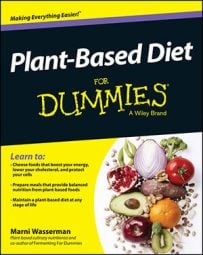Here’s a rundown of basic tips to help you make sure you’re consuming fat in a way that helps, not harms, you in a plant-based diet:
Choose good sources of high-quality fat, such as olives, coconuts, seeds (especially flax), avocados, and raw organic nuts.
Always choose organic foods for safe fats, as many industrial chemicals and commercial farming chemicals are fat soluble and stored in the fats of animals, fowl, fish, and plants.
Avoid certain fats, such as trans fatty acids, hydrogenated or partially hydrogenated oils, vegetable oils (the high temperatures used to produce such oils destroys the nutrients in the oil), and fats from conventionally raised animals and fish.
If purchasing EFA supplements, contact the manufacturer to determine the carrier oil (base oil) if it isn’t listed on the label. Soy oil is commonly used because it’s cheap. Horrifyingly enough, the carrier oils are often rancid upon arrival and have already drawn the antioxidant qualities out of the good oil in the capsules.
Avoid eating roasted nuts because the roasting process causes the fats and oils to go rancid, increasing free-radical damage in your body. In other words, they make you age more quickly.
Avoid any and all deep-fried foods unless you prepare them yourself using coconut oil (of course, frying and deep-frying should always be kept to a minimum).
Always use heat-stable fats and oils, such as grapeseed and coconut oil, for cooking. Avoid using polyunsaturated olive oil.
Always use pure, unrefined, organic oils for uncooked items. Flaxseed oil, hemp oil, and olive oil are good choices.
Never eat any food from fast-food restaurants. They use low-quality foods and fats, many of which are highly processed.
Parents should make a special effort to ensure that their growing children get adequate omega 3, which is one of those essential fatty acids. It’s worth it. Whatever it takes, feed your children organic food!

